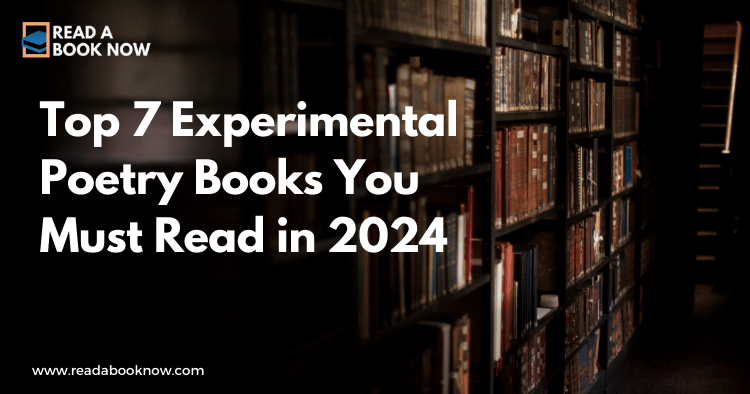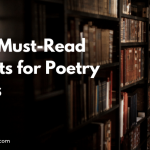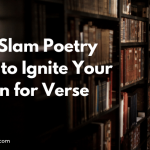Table of Contents
- Introduction
- What is Experimental Poetry?
- Top 7 Experimental Poetry Books
- 1. “The Language of My Captor” by Shane McCrae
- 2. “The Book of Disquiet” by Fernando Pessoa
- 3. “Futurism” by Various Authors
- 4. “The Collected Poems of Emily Dickinson” (edited by Thomas H. Johnson)
- 5. “How to Be Drawn” by Terrance Hayes
- 6. “Ariel” by Sylvia Plath
- 7. “The Complete Poems” by Anne Sexton
- Conclusion
- FAQs
Introduction
Welcome, poetry enthusiasts! If you’re looking to dive into the rich and dynamic world of experimental poetry, 2024 has a treasure trove of books waiting for you. Experimental poetry pushes the boundaries of language and form, inviting readers to engage with verse in new ways. In this blog, we’ll explore seven must-read experimental poetry books that promise to challenge and inspire you this year.
What is Experimental Poetry?
Experimental poetry is a form that breaks away from traditional structures, exploring new techniques, forms, and ideas. It often defies conventional grammar and syntax, encouraging readers to experience language differently. Whether through fragmented narratives, innovative use of space, or multimedia elements, experimental poetry invites a playful interaction with text. This genre can encompass everything from visual poetry to sound poetry, making it a vibrant field of artistic expression.
Characteristics of Experimental Poetry:
- Non-traditional formats: Poems may not follow standard line breaks or stanzas.
- Innovative language: Language may be manipulated in ways that challenge traditional meanings.
- Interdisciplinary influences: Incorporates elements from visual art, music, and performance.
For more in-depth insights, you can check out The Poetry Foundation.
Top 7 Experimental Poetry Books
1. “The Language of My Captor” by Shane McCrae
Shane McCrae’s “The Language of My Captor” is a poignant exploration of identity, race, and captivity. McCrae’s work is known for its unique voice and deep emotional resonance. This collection challenges readers to confront uncomfortable truths about systemic racism and personal trauma. McCrae employs fragmented language and shifting perspectives, creating a dynamic reading experience that is both unsettling and enlightening.
2. “The Book of Disquiet” by Fernando Pessoa
Although technically a collection of prose poetry, Fernando Pessoa’s “The Book of Disquiet” is a cornerstone of experimental literature. Written in the early 20th century, it reflects the fragmented psyche of its author through a series of disjointed thoughts and musings. Pessoa’s use of heteronyms—distinct personas with their own writing styles—adds a layer of complexity that continues to captivate readers. This timeless work invites contemplation on existence, self, and the nature of reality.
“The true poet is not one who seeks to express, but one who seeks to discover.”
3. “Futurism” by Various Authors
Futurism, a movement that emerged in the early 20th century, celebrated technology, speed, and modernity. This anthology showcases experimental poetry from prominent Futurists like Marinetti and Carrà. The poems are characterized by their energetic language and avant-garde visuals, often incorporating typography and layout to enhance the reading experience. If you’re interested in the intersection of art and literature, this collection is a must-read.
4. “The Collected Poems of Emily Dickinson” (edited by Thomas H. Johnson)
Emily Dickinson’s poetry is often regarded as experimental due to its unconventional punctuation, capitalization, and use of slant rhyme. The collected works edited by Thomas H. Johnson provide a comprehensive view of Dickinson’s innovation in form and content. Her poems often explore themes of death, immortality, and nature, all while pushing the boundaries of poetic structure. Reading Dickinson is like embarking on a journey through the inner workings of a profoundly original mind.
“Hope is the thing with feathers that perches in the soul.”
5. “How to Be Drawn” by Terrance Hayes
Terrance Hayes’s “How to Be Drawn” is a brilliant exploration of race, identity, and the complexities of the human experience. Hayes employs a unique blend of lyrical language and innovative structures, creating a rich tapestry of meaning. His work invites readers to reconsider their perceptions and offers insights into the beauty and struggle of life. This book is a testament to the power of experimental poetry to address contemporary issues in a deeply personal way.
6. “Ariel” by Sylvia Plath
Sylvia Plath’s “Ariel” is a groundbreaking collection that showcases her mastery of language and form. Written during a tumultuous period in her life, the poems are marked by emotional intensity and striking imagery. Plath’s use of symbolism and her exploration of themes such as identity and despair make this collection a significant work in the realm of experimental poetry. Each poem is a visceral experience, inviting readers to delve into the complexities of the human psyche.
“The worst thing about being me is that I can’t be you.”
7. “The Complete Poems” by Anne Sexton
Anne Sexton’s “The Complete Poems” offers a profound look at mental health, identity, and the feminine experience. Sexton’s candid and often raw approach to her subject matter challenges societal norms and invites readers into her world. Her experimental use of form and structure, particularly in her confessional style, pushes the boundaries of traditional poetry. This collection is essential for anyone looking to understand the evolution of modern poetry and the importance of personal narrative.
“I am the poet, and I am the poem.”
Conclusion
As we look ahead to 2024, these seven experimental poetry books promise to enrich your reading experience and broaden your understanding of poetic form. Whether you’re a long-time poetry lover or just beginning your journey, these works encourage exploration and innovation. So, grab a cup of tea, find a cozy spot, and dive into the transformative world of experimental poetry!
FAQs
What makes poetry experimental?
Experimental poetry often breaks traditional forms of poetry, using innovative structures, language, and themes. It challenges readers to engage with the text in new and exciting ways.
Is experimental poetry difficult to understand?
While some readers may find experimental poetry challenging, it can also be deeply rewarding. The key is to approach it with an open mind and a willingness to explore the multiple layers of meaning.
Where can I find more resources on experimental poetry?
You can explore more about experimental poetry on Poets.org and The Poetry Foundation. Both sites offer a wealth of information on poets, styles, and movements.
Can you recommend any online courses on poetry writing?
Absolutely! Websites like Coursera and edX offer various poetry writing courses that cater to different skill levels. Check them out to enhance your poetic skills!
In addition to exploring experimental poetry, you might also be interested in classic literature. Check out the Top 7 Ancient Classics Everyone Should Read Today or the Top 10 Must-Read 18th Century Classics for insights into timeless works that continue to shape literary conversations. Happy reading!




